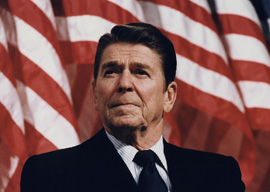
October 22, 2011

Ronald Reagan
Ironically, the dream-factory residents’ most common refrain is their right to privacy. But while many things are secret in politics, very few are private for politicians.
This is not to say politics carry no perks or privileges. There certainly are some. Yet there are overwhelming, relentless, and (for the uninitiated) unimaginable burdens. Those “three-day weeks” and “vacations” are scheduled so hundreds of legislators have time to rush back home for days and weeks of meetings or the endless fundraisers now required to maintain office. An interminable road trip. No one need feel sorry for politicians, but it grates whenever any outsider casually assumes managing someone else’s profession is an easy task.
Part of this egoism originates due to the fact that because entertainers succeed in pretending to be intelligent, they assume they are suited to the role in reality. Another aspect may be that because actors have been incredibly fortunate they think they are not merely lucky but ordained. Every lottery winner wants to believe that Providence chose them.
The vast majority of high-ranking politicians would never for one minute entertain that they could carry a $100-million blockbuster on their shoulders, though Joe Hollywood doesn’t pause before thinking he can easily resolve an over $1-trillion budget deficit, ease or erase age-old ethnic tensions, and do it all before effortlessly wrapping up the ten thousand little problems of the ten thousand “little people” of any given constituency.
The Alec Baldwins, Angelina Jolies, and George Clooneys have always been with us going as far back as Warren Beatty—a superior talent to all three, though that talent is strictly limited to entertainment. Some say that entertainers couldn’t do worse than politicians. They are wrong. Most political problems never make the media in the first place. If something dire is resolved and you never heard about it, that probably means a politician has done his job correctly. There are reasons why a president goes grey within a few months of taking office, why few high-level staff last more than a year or two, and why more than a few poor souls crack up along the way.
There are exceptions, such as the actor who spectacularly made the transition from performer to political personage. But he never had the conceit of considering himself equal to running the country as his first political position. He was head of a labor union while still on the soundstage and supplemented this experience with later spokesman work for a national corporation. Thus, he had practical training as a campaigner, a lobbyist, and with administration.
There have been other somewhat successful examples. Clint Eastwood was mayor of a small town. Elizabeth Taylor had her foray as Congressional wife. After having to answer to the public for a time rather than be adored by it, each decided perhaps the best parties were not political ones. Even the seemingly popular Jesse Ventura decided once was enough for him.
Politics is often tedious, when it isn’t filthy, and that is when not absolutely terrifying. It is not an arena for dilettantes, because its intricacies can be incredibly serious. Movie mavens should stick to the sanitized version of events which appears in the theater’s half-light. Real life’s screenplay is a story seldom told which very few of them would ever believe or want to play a part.